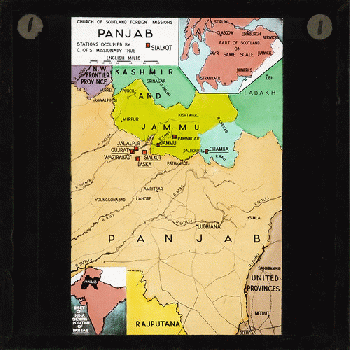
Map Displaying Church of Scotland Foreign Mission Stations in the Indian states of Punjab and Kashmir and Jammu, ca.1875-ca.1940 (imp-cswc-GB-237-CSWC47-LS10-0 01)
(Image by F) Details DMCA
Pakistan occupied (read administered) Kashmir (PoK) is a part of India and New Delhi expects to have physical jurisdiction over it one day, Indian external affairs minister S Jaishankar said on Tuesday (Sept 17).
"Our position has, is and will always be very clear on PoK, that it is part of India and we expect one day we will have physical jurisdiction over it," he told reporters in New Delhi.
Similarly, on August 18, Indian Defense Minister Rajnath Singh said: "If talks are held with Pakistan, it will now be on PoK.
The defense minister's comment came two days after he said India reserves the right to revoke its 'no first use' policy, the cornerstone of India's nuclear weapons policy for decades. In response to Singh's comment on a rethink of its nuclear no first use policy, Pakistan said it stood ready to repulse any attack from India and also described Kashmir as a "nuclear flash point".
Ties between India and Pakistan have been tense since India annexed Jammu and Kashmir disputed territory which remained under siege since August 5, 2019.
Pakistan Prime Minister of Pakistan, Imran Khan, Saturday warned of "consequences" if nuclear-armed Pakistan ends up losing a conventional war to its nuclear-armed neighbor India.
In an interview with Al Jazeera, Imran Khan said he "absolutely" believes war with India could be a possibility.
"Pakistan would never start a war, and I am clear: I am a pacifist, I am anti-war, I believe that wars do not solve any problems," he said but, he added: "When two nuclear-armed countries fight, if they fight a conventional war, there is every possibility that it is going to end up into nuclear war. The unthinkable."
"If say Pakistan, God forbid, we are fighting a conventional war, we are losing, and if a country is stuck between the choice: either you surrender or you fight 'til death for your freedom, I know Pakistanis will fight to death for their freedom. So when a nuclear-armed country fights to the end, to the death, it has consequences.
India and Pakistan have fought three major conventional wars since 1947, along with several smaller border skirmishes. Most of the clashes are centered around the Kashmir region, where cross-border shelling frequently takes place along the Line of Control (LoC).
Modi government tried to crush Amnesty for J&K criticism
Meanwhile, the chief of Amnesty International on Monday said that the Indian government was intimidating the rights group for voicing its concerns about the situation in Kashmir.
"The Modi government has made a very big attempt to crush Amnesty in India," Kumi Naidoo, Amnesty International's secretary-general, told AFP in an interview.
Naidoo added that the rights group would not be silenced. "On the Kashmir question, on various human rights questions in India itself, we are not intimidated," he said. "While our colleagues in our Indian office are under stress, they are as committed, motivated and courageous as ever, if not more, as a result of the repression that we face."
Earlier this month, the Enforcement Directorate had accused Amnesty's local branch of violating foreign exchange regulations to the tune of over Rs 51 crore. The investigating agency's show cause notice came after Amnesty International India criticised the Centre's move to scrap Jammu and Kashmir's special status. It had asked Prime Minister Narendra Modi to immediately lift the communications blackout in the state and hold dialogue with the people of the state.
(Note: You can view every article as one long page if you sign up as an Advocate Member, or higher).





